Method of testing
High-Voltage AC
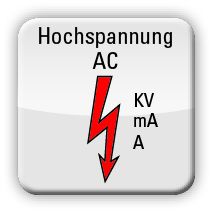
The high-voltage test AC (alternating voltage) serves for testing the electric insulation capability and voltage proof of clearance and leakage paths at electric components, modules, machines, devices and systems according to various national and international regulations.
High-Voltage Test > 6000 V:

The level of the test voltage, the duration of the test, the type of test and the maximum allowed leakage current are stipulated in the standards.
In principle, the high-voltage test is performed at the same connections as at the insulation-resistance test.
In contrary to the insulation-resistance test, however, the high-voltage test is performed with much higher test voltages. The test voltage can be both AC and DC.
When testing with AC, both the current of the ohmic insulation resistance and of the capacitive insulation resistance is detected. I.e. a total current is calculated from the ohmic and the capacitive part.
Especially at electric motors, this may sometimes effect, that a very high current is necessary for the high-voltage test. This high current is flowing, because the capacity of the test object is very high.
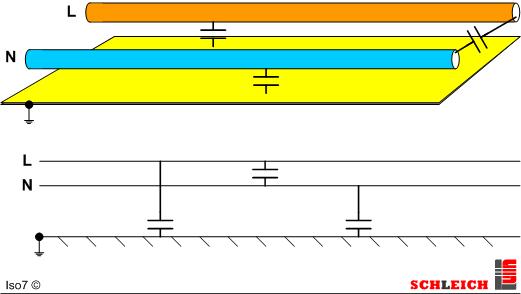
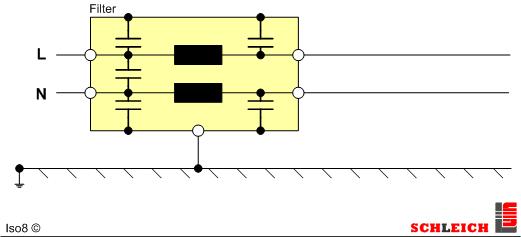
As an alternative to testing with AC, it is also possible to test with DC. This has the advantage that, similar to the insulation-resistance test, after a charging time of the capacitors, only the ohmic insulation resistance can be detected.
At the high-voltage test, the conducting test current must never be higher than a certain limit value. If this limit value is exceeded, the test voltage will be switched off immediately and automatically.
It is also possible to pre-set a minimum current. Especially in case of test objects, where a capacitive current is flowing at the high-voltage, it is possible to pre-set a minimum current. As soon as the minimum current is flowing, you can be sure that the test object is under high-voltage. This minimum current test is especially simple at the high-voltage test with AC. However, the minimum-current test is also possible at the high-voltage test with DC. Upon switching on the high-voltage test DC, the capacity in the test object is charged for a short time. This charging current impulse can be detected and serves as limit value pre-setting.
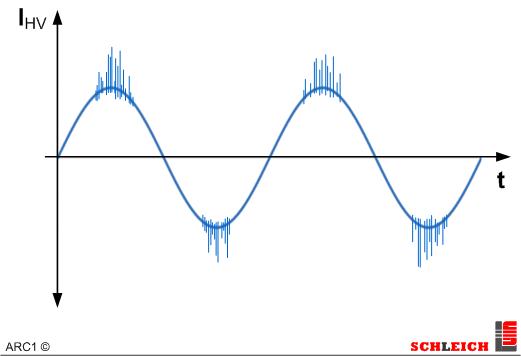
Optionally we deliver testers with ARC detection. They allow to detect discharges, which do not yet lead to a complete breakdown. In case the micro discharge increases too much, the test is interrupted.
High-voltage tests are often performed at various test points by contacting the test points manually with high-voltage test pistols.
It is also possible to build fully-automatic testers with extensive matrices (switch-over fields) for the automatic testing at several HV test points. There is almost no limitation for the amount of matrix points.
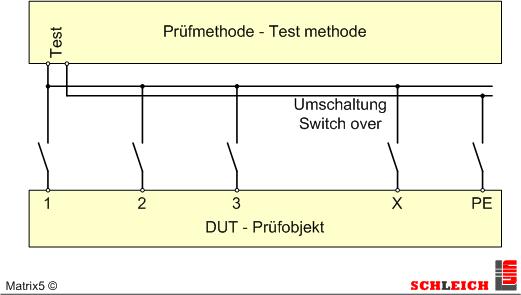
Easy switchover to test from different test points against a central test point, e.g. for testing PE.
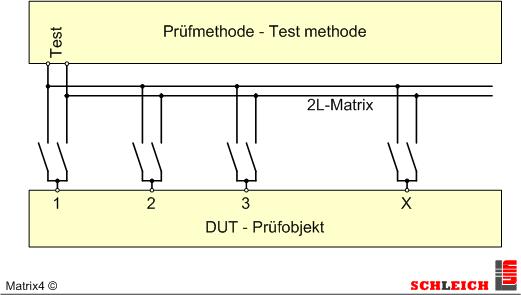
2-wire matrix, to test any test points "anyone against anyone".
Which testers does SCHLEICH supply?
- single testers
- combination testers (combination with safety tests)
- Manual tests via test pistols
- fully automatic tests
- matrices with up to 500 clamps and fully-automatic switchover
- testers with automatic ramp
- testers with 100 KV AC
- testers with 100 KV DC
- DC high-voltage modules
- test pistols
- various tester classes
Standard committees
For legal reasons, in many cases, we cannot make an obligatory statement about the test conditions. Important for the application is the currently valid standard for your product to be tested.

Depending on the geographical location of the product, the standards to be applied can vary. For further information, please refer to the following institutes.
![]()

![]()

![]()
Request detailed information - The SCHLEICH test methods Fibel
Fields with * are mandatory.
Data Privacy Statement
Data Protection
The operators of this website take the protection of your personal data very seriously. We treat your personal data confidentially and according to the legal data protection regulations and this Privacy Policy.
The use of our website is usually possible without providing personal data. Personal data, such as names, addresses or e-mail addresses, are always provided on a voluntary basis if possible. Those data will not be passed on to third parties without your explicit permission.
However, we would like to point out that data transmissions via internet (e.g. e-mail communication) cannot be entirely secure and may have security vulnerabilities. A complete protection of personal details against unauthorised access by third parties is not possible.
Cookies
This website partially uses so-called cookies. Cookies do not cause damages to your computer and do not contain viruses. Cookies allow us to make our offer more user-friendly, more efficient and more secure. Cookies are small text files, stored by your browser on your computer.
The most cookies that we use are so-called “session cookies”. They will be deleted automatically after the end of your visit. Other cookies remain on your terminal device. Those cookies enable us to recognise your browser on your next visit.
You can adjust your browser that way in order to be informed when cookies are placed, to individually allow cookies or to generally exclude cookies in certain cases as well as to activate the automatic deletion of cookies when closing the browser. The deactivation of cookies may impair the functionality of this website.
Server-log-files
The provider of these websites automatically collects and stores information in so-called server log files which your browser automatically transmits to us, such as
- browser type/version
- used operating system
- referrer URL
- host name of the accessing computer
- time of query
Those data cannot be associated with individual persons. A merging with other data sources does not take place. We reserve the right to retrospectively check the data if reasonable evidences concerning illegal use become known.
Contact form
If you send enquiries to us via the contact form, your data entered into the contact form, including the stated contact data, are stored for the purpose of dealing with your enquiry and in case of additional enquiries. Those data will not be passed on without your permission.
Newsletter
If you would like to receive the newsletter offered on our website, we require your email address as well as information which allow us to check that you are the owner of the provided email address and that you agree to the reception of the newsletter. Further data will not be collected. We use those data exclusively for the sending of the requested information and do not transmit them to third parties.
The given permission to the storage of the data, the email address as well as the use of such for the purpose of sending the newsletter can be withdrawn at any time via the "Unsubscribe"-link within the newsletter.
Privacy Policy for the use of Google Analytics
This website uses Google Analytics, a website analysis service by Google Inc., 1600 Amphitheatre Parkway Mountain View, CA 94043, USA.
Google Analytics uses so-called "cookies", text files that are stored on your computer to analyse your use of the website. The information generated by the cookie about your use of this website is usually sent to and stored at a Google server in the U.S.A.
You find more information concerning the treatment of user data by Google Analytics in Google's Privacy Policy: https://support.google.com/analytics/answer/6004245?hl=de
Browser Plugin
You may prevent the installation of cookies by adjusting the settings of your browser; however, if you do so, you may be unable to use all features of this website. Further, you may prevent the collection of data generated by cookies (including your IP address) and related to the use of this websites as well as the processing of such data by Google by downloading and installing the plug-in under the following link: http://tools.google.com/dlpage/gaoptout?hl=en
Objection to Data Collection
You may prevent the collection of data by Google Analytics by clicking the following link. Doing so, an Opt-Out-Cookie will be placed which prevents future data collection when visiting our website: Disable Google Analytics
IP-anonymisation
We us the function "Activate IP-Anonymisation". Through this, your IP-address will be shortened priory within the member states of the European Union or other contractual states of the Treaty on the European Economic Area. Only in exceptional cases your complete IP-address will be transmitted to a server in the U.S.A. and shortened there. Commissioned by the operators of this website, Google will use this information to evaluate your use of the website, to compile reports on website activities for website operators and to provide other services related to website and internet activities. Google will not merged your IP address with any other data held by Google.
Privacy Policy for the use of Google Web Fonts
For the homogenous display of fonts, this website uses so-called web fonts that are provided by Google. On retrieving a website your browser downloads the necessary web fonts to your browser cache in order to correctly display texts and fonts. If your browser does not support web fonts, your computer uses a standard font.
For further information, please see https://developers.google.com/fonts/faq as well as Google's Privacy Policy: https://www.google.com/policies/privacy/
Privacy Policy for the use of Google Maps
This website uses the map service Google Maps via API. This service is provided by Google Inc., 1600 Amphitheatre Parkway Mountain View, CA 94043, USA. To use the functions of Google Maps it is required to store your IP address. This information will usually be transferred to and stored on a server in the USA. The provider of this website has no influence on this data transmission.
For further information, please see Google's Privacy Policy: https://www.google.de/intl/de/policies/privacy/
Right to Information, Deletion, Blocking
You have the right to be informed about your person-related data, their origin and addressee and the purpose of data processing as well as the right to correction, blocking or deletion of those data at any time and free of charge. For further questions and questions concerning person-related data, feel free to contact us under the address published in the impressum/legal notice.
Objection to commercial mails
Providers are obligated to publish contact information in the Legal Note/Impressum. The use of such contact information by third parties for the purpose of distributing unsolicited advertisements or other commercial information is prohibited. The operators of this website reserve the right to take legal measures in case of being sent unsolicited commercial information, e.g. spam mails etc.
